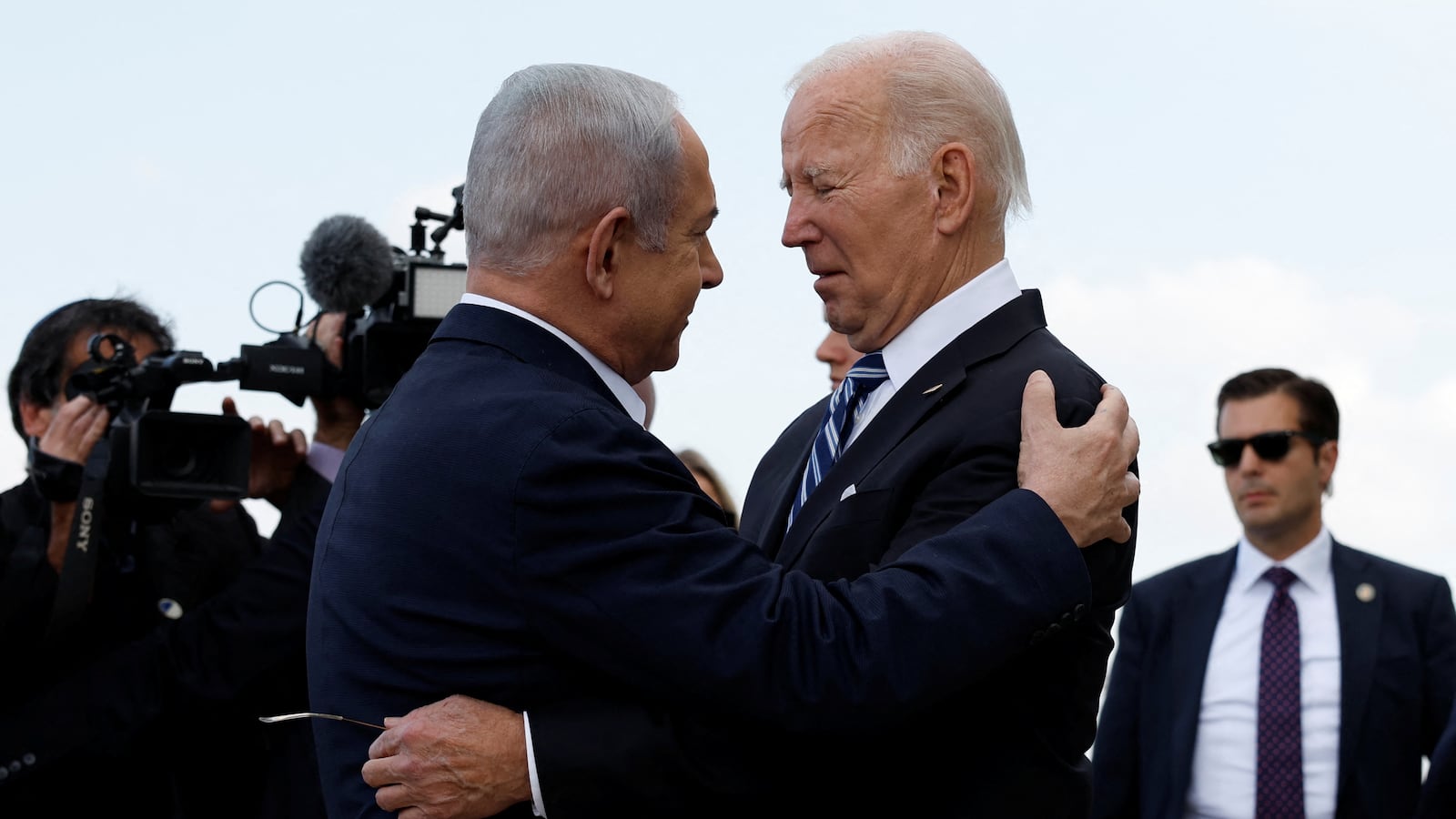Israel’s retaliatory attack against Iran early Friday came despite President Joe Biden’s stringent warnings against doing just that to Israeli Prime Minister Benjamin Netanyahu, with the leaders appearing to become increasingly at odds about how Israel should respond against its enemies.
The U.S. was only tipped off about the attack “at the last minute,” according to the Italian foreign minister who spoke to American officials at a meeting of the G7 on Friday morning.
Iran has so far played down the significance of the attack, with state media portraying the incident as involving a few drones that were taken down without causing damage. American sources, however, have suggested the strike involved missiles—though the severity of the damage caused by the attack is not yet clear.
What is clear is that the U.S. fears the retaliatory strike could cause Americans to be put in harm’s way. The U.S. Embassy in Israel on Friday issued a security alert restricting the personal travel of American government employees and their families outside of specific areas. The advisory specifically cited “reports that Israel conducted a retaliatory strike inside Iran” as the motive for the restrictions.
The embassy had taken a similar step last week over fears that Iran was planning to attack Israel in retaliation for airstrike attacks on an Iranian consulate in Syria. When the unprecedented Iranian attack did arrive on April 13, the U.S. played an integral role in the defense of Israel, shooting down scores of drones and several ballistic missiles in flight.
Despite the huge show of military support, Biden warned Netanyahu that the U.S. would have no part in any retaliatory strike against Tehran. He also cautioned against seeking vengeance at all, instead reportedly encouraging Bibi to “take the win” of preventing Iran’s strike causing widespread death and destruction.
Cornelius Adebahr, an associate fellow at the Carnegie Endowment for International Peace think tank, says Netanyahu’s disregard for Biden’s admonitions is yet another illustration of the limits of U.S. leverage on Israel.
“This is something we’ve seen over the past six months play out in Gaza, where the U.S. president has also been very vocal on what to do and what not to do,” Adebahr told The Daily Beast. “The jury is still out on what happens next with Rafah, for example. So to an extent, [Israel’s strike] is a confirmation of an existing pattern that no, the U.S. president cannot dictate to the Israeli prime minister what to do.”
It wasn’t just Biden. United Nations Secretary-General António Guterres said over the weekend that the entire Middle East is “on the brink” and said region is facing the “real danger of a devastating full-scale conflict.” “Now is the time to defuse and de-escalate,” he said. European officials similarly warned against further escalation.
But the U.S., whose troops in the Middle East have faced hundreds of attacks from Iranian proxies in recent months following Hamas’ Oct. 7 rampage, has more to worry about than the risk of an all-out war between Iran and Israel. New assaults targeting American forces, Adebahr says, are a “real concern.”
“The concerns are very concrete when it comes to U.S. troops in the region,” he said. “They are much broader when it comes to, you know, where does this conflict end and will there be a major war? So the United States has to worry at different levels.”
“We are in uncharted territory, I have to say,” Adebahr added. “This is the third unprecedented strike of the past two or three weeks. The real question now is: Is this something that Iran feels it can or should play down?”
Edward Luce, author of The Retreat of Western Liberalism, pointed out that this could be an inflection point, and one where the White House has limited power to control events. “The degree of Netanyahu’s contempt for Biden is hard to overstate,” he wrote on X.
Nomi Bar Yaacov, an associate fellow with the London think tank Chatham House, said the limited scale of Israel’s attack showed that there was some evidence of successful pressure from Netanyahu’s allies.
“Israel’s dawn counter-attack in Isfahan, Iran was aimed at sending Iran a message that Israel has the capability to strike with precision deep inside Iran without the need to resort to fighter jets,” Yaacov said in a statement to The Daily Beast. “It was carried out in a manner that will allow Iran to deny the attack and draw a line under it.”
Yaacov added that the strike itself was “measured” following “pressure from the U.S., U.K. and other allies not to escalate tensions in the Middle East, ensuring only the site from which Iranian drones were launched on Saturday night was hit, avoiding casualties.”
Disagreements over Iran aside, the White House on Thursday said it had once again “expressed concerns with various courses of action in Rafah,” the city in southern Gaza where over a million Palestinians are seeking shelter. Biden has repeatedly warned Netanyahu against a ground invasion of the city, fearing there is no way of conducting such an operation while adequately protecting civilians.
Netanyahu, on the other hand, has repeatedly vowed that an offensive in Rafah is on the way. Earlier this month he said a date has been chosen for the attack to begin, though he did not publicly reveal when that will be. Netanyahu has also consistently promised to deliver a “total victory” over Hamas, insisting that Rafah remains the final Hamas stronghold in Gaza.







